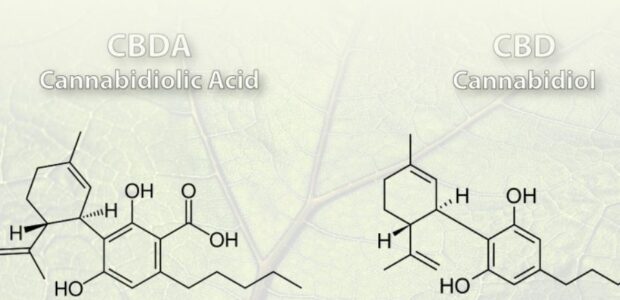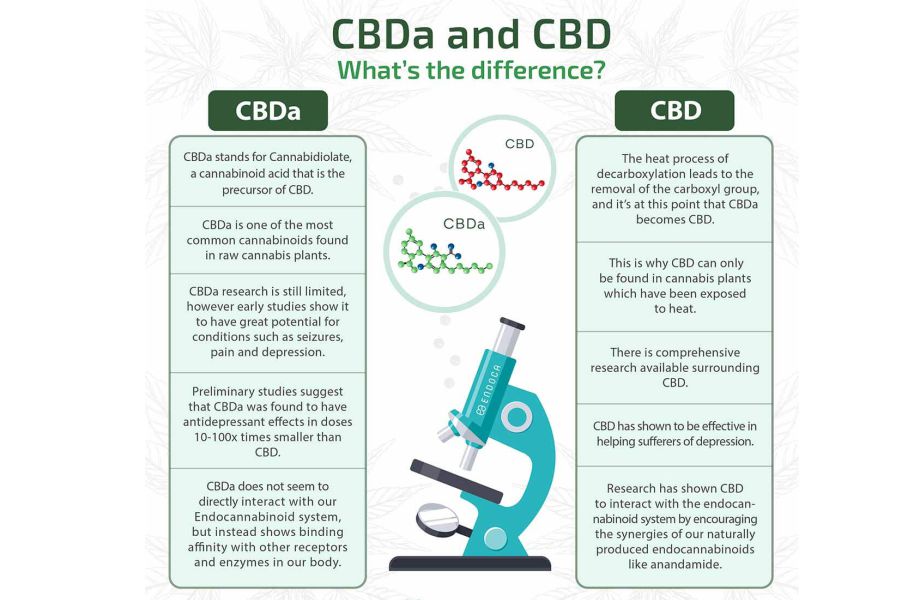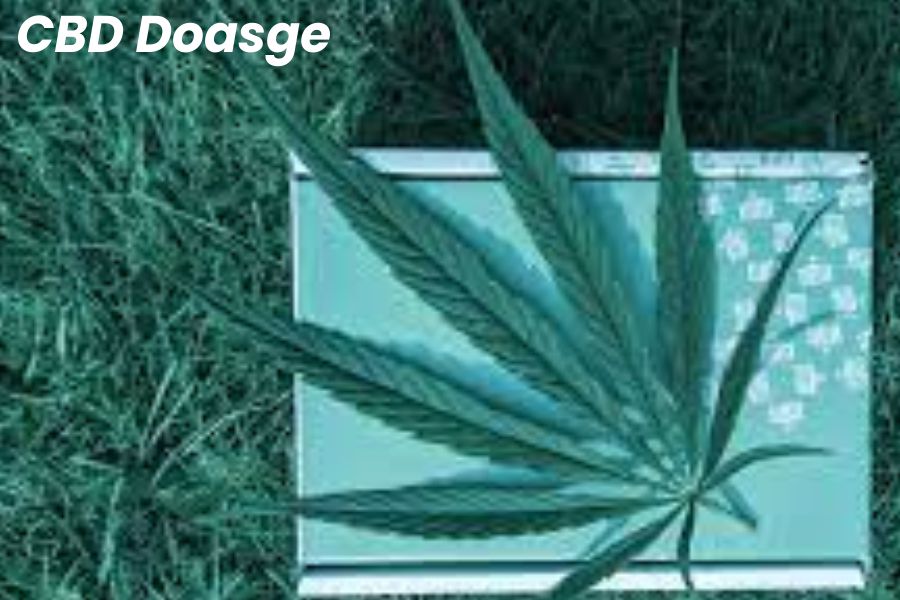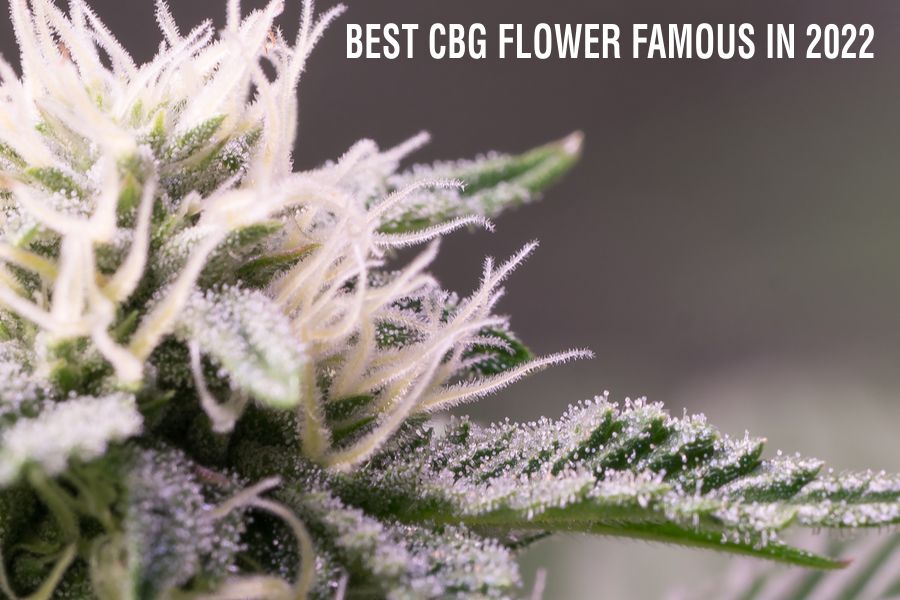
Before explaining CBD vs CBDA benefits, we need to understand their fundamental properties and what sets them apart. We often come across queries such as – the benefits of CBDA vs CBD and whether is CBD or CBDA better.
CBD versus CBDA: You’ve probably heard about CBD. But what about CBDA? What exactly is CBDA? Are there any CBDA advantages? Also, which CBDA oil is the greatest on the market? CBD products are most likely on the shelves of retailers near you. CBD is becoming increasingly popular. CBDA and other cannabinoids are already making their way onto the health supplement market. CBDA is not a misspelling. Also, CBDA and CBD are not interchangeable. They are distinct compounds, despite their close closeness.
In this write-up, we’ll go deep into CBDA and tell you all you need to know about it, as well as CBD, before you buy a bottle. We will discuss CBDA advantages as well as CBD benefits and other topics.
Is CBDA more effective than CBD?
It’s too early to say until we get real data from human testing! However, a preliminary study shows that raw CBD oil may be just as beneficial, if not more, in treating conditions such as depression, nausea, and inflammation. It may also contain unique qualities that CBD does not, making it suitable for a variety of ailments.
CBDA has anticonvulsant properties and may also be antibacterial, antioxidant, and cancer-preventive (specifically breast cancer). While determining if CBDA is “better” than CBD is difficult, there is enough early data to show that CBDA has distinct properties that may set it apart from CBD in certain areas.

The fundamental difference between CBD vs. CBDA
- Cannabidiolic acid is a cannabinoid, a type of chemical present in cannabis. CBD is a cannabinoid as well, but you won’t find much of it in a fresh cannabis plant. Instead, significant levels of CBDA would be present.
- CBDA is a molecule that transforms into CBD. It is an acid precursor to CBD form when raw cannabis containing CBDA is cook, inducing decarboxylation. CBDA is found in plants still growing, unlike CBD, which originates from mature and cured cannabis plants.
- CBD has more scientific research than CBDA, becoming a prevalent cannabinoid. CBDA, like other cannabinoids, can be use to make therapeutic products.
Here we’re going to break down some of those differences for you. We’re debunkin’ CBD and CBDA, answering the most common questions about the health advantages of these gifts derived from mother nature.
What is the difference between CBD and CBDA?
- Cannabinoids, such as CBD and CBDA, are a type of natural substance found in cannabis plants. Cannabis plants, such as hemp and marijuana, naturally contain CBDA (or cannabidiolic acid). It’s the most honest, potent, and unprocess form of CBD and the acidic type of CBD that hasn’t been broken down by drying, curing, or heating (also known as decarboxylation). A cold extraction procedure should be employ to retain and acquire the full benefits of CBDA.
- It can be tough to make a comparison between CBD and CBDA. The two chemicals provide different therapeutic benefits based on their numerous interactions with the body’s structures. CBDA and CBD generated from cannabis plants like hemp and marijuana are “non-psychoactive chemicals,” They don’t make you feel high or stoned.
- CBDA is consider thousand times more potent than CBD, according to research, because CBDA has a higher level of bioactivity and bioavailability than CBD, although in lesser dosages to get identical results.
Benefits of CBDA vs. CBD?
CBDA is found in relatively large quantities in raw cannabis plants and products. Certified products contain at least 10% more CBD than marijuana. The endocrine system uses cannabinoids that exist in the human body to support various bodily functions, including respiration, metabolism, reproduction, sensory perception, movement, sexual development, and growth. As a result, because cannabis plants contain dozens of cannabinoids, cannabinoids maybe consider a health supplement.
CBDA research is ongoing, with new information being discover all the time. Some of CBD’s numerous advantages are well known.
- Supporting a healthy cellular response: According to some research, CBDA may positively affect the body’s response to cellular and tissue support.
- Relief from nausea and vomiting: According to one study on rats and the Suncus murinus (Asian house shrew), CBDA may help to reduce nausea and vomiting by increasing 5-HT1A receptor activation.
Try CBDA for keeping pain and stress at bay
- CBDa may help reduce stress levels: According to a 2008 study, CBDa may help to reduce stress-induced behavior.
- Relieve joint pain: Although more research is needed, CBDa supports healthy joints in a rodent model by producing an anti-hyperalgesia effect.
BENEFITS OF CBD
CBD contains many of the same benefits as CBDa. And, just as research into CBDa continues, so does CBD research. Here are some examples:
The following are some of CBD’s well-known properties:
- Internal balance (homeostasis) is support: When cells in the body do not function correctly, and in harmony, this is call homeostasis imbalance. Cellular damage may occur as a result. CBD may be beneficial in resolving internal imbalances.
- Promotes relaxation and mood stabilization: There is growing evidence that CBD encourages the body to relax, which may help with mood.
- Aids in maintaining healthy skin, nails, and hair: There is some evidence that CBD may be beneficial to skin health and disorders.
- According to research, CBD may support healthy blood flow and reduce the effects of oxidative stress and cardiac dysfunction.
- Studies reveal that CBD is quite effective in promoting sleep patterns.
QUESTIONS AND ANSWERS ABOUT CBDA AND CBD
Is CBD safe?
CBD is consider safe because the body tolerates it well. Some side effects may include dry mouth, diarrhea, decreased appetite, drowsiness, and fatigue.
Will CBDA or CBD get me high?
No, CBDa and CBD will not get you high. Hemp comprises of fewer than 0.3 percent THC (the main psychotropic compound in cannabis that produces a high sensation). It is not intoxicating.
How is CBD consumed?
CBD is typically available in a tincture, which is administer by placing a few drops under the tongue and holding them there for a few moments before swallowing. Topical creams and ointments are also available.
Is it legal to use CBDa and CBD?
Yes. CBDa and CBD are legal in all 50 states in the United States.
How does CBDa function?
CBDa, like CBD, interacts with the body’s endocannabinoid system. It acts on CB1 receptors in the brain and CB2 receptors throughout the body. As a result, it can benefit the entire body to maintain a healthy balance. While CBDa research is still in its early stages, studies have shown great potential for its applications and health benefits. As more clinical trials are conducted, CBDa and CBD will undoubtedly continue to demonstrate their worth as one of Mother Nature’s great healing gifts.
You may also like – CBN vs CBG vs CBD
Final Verdict – CBDA and CBD can improve the wellness regimen
As you can see, CBDA has its own distinct potential in the burgeoning cannabis market. While much of the study on CBDA’s potential is still in its early phases, there is enough data to offer experts and avid supplement users hope.
CBDA may be another fantastic alternative to add to your health and wellness regimen for those of you who are just putting your toes into the CBD/health supplement seas. CBDA is regarded to be risk-free, as it does not produce a high or pose any possible hazards associated with THC. Raw CBDA may be just what you need to improve your wellness regimen!


